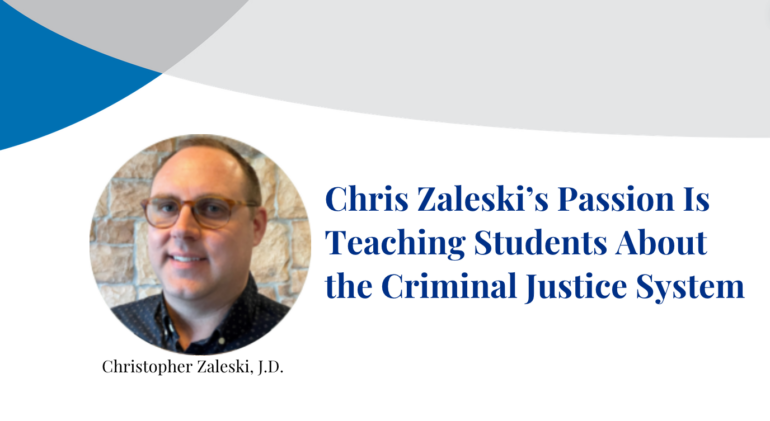Before teaching at The Chicago School, Chris Zaleski, J.D., department chair and director of General Education, worked in a variety of positions in the criminal justice field, gaining valuable experience at each stop.
“I started off as a police dispatcher, then a parole officer, and then oversaw policy and planning for the state parole board in New Jersey before becoming the chief probation officer in Denver,” Zaleski says. “I’ve seen a lot of aspects of the criminal justice system that have shown me how the system works.” After being a first responder during the attacks in the U.S. on Sept. 11, 2001, Zaleski says he felt his calling to teach.
“For most of my career, they asked me to teach criminal law and procedure to new recruits. I loved doing that,” Zaleski says. “After 9/11, I recognized that I needed to help train the next generation of police officers.” When offered an adjunct professor position, Zaleski jumped at the opportunity.
At The Chicago School, Zaleski says his passion is seeing students learn more about the criminal justice system. “I see these students, and I remember where I was, wishing I had folks helping me understand how it worked,” Zaleski says. “I love watching students have those ah-ha moments, learning something they didn’t know.” He says his main goal within the criminology program is to have students study crime, helping them understand theories around crime and personality.
Another way Zaleski says he helps prepare students is through the integration of criminology and public health, an objective that reflects The Chicago School’s long-standing commitment to integrated health. “In criminal justice, drug use, gun violence, homelessness, and inmates in prison getting sick from COVID are all public health matters,” he says.
Zaleski recognizes helping students understand this reality means separating fact from fiction. “Depictions on TV shows are not what really happens in criminal justice,” Zaleski says. “The hardest part of teaching criminology is trying to get past those myths with students.”
Zaleski says he hopes to equip students with the tools to change the criminal justice system for the better. “We’re trying to get students prepared with career-ready skills. By the end, you’ll understand criminal investigations and criminal laws,” he says. “The importance is to not get your degree but to get career-ready skills. We want them to be more prepared to work in their career field and to be helpful with policymaking and problem-solving.”

